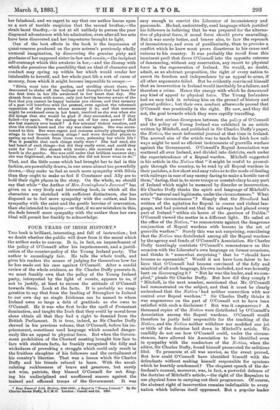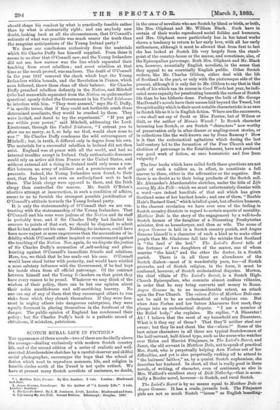FOUR YEARS OF IRISH HISTORY.* Tam book is brilliant, interesting,
and fall of instruction ; but we doubt whether the public will draw from it the moral which the author seeks to convey. It is, in fact, an impeachment of the policy of O'Connell after his imprisonment, and a justifi- cation of the counter-policy of the Young Ireland party. The author is exceedingly fair. He tells the whole truth, and gives his readers the means of judging for themselves how far he has made out his case against O'Connell. After a candid review of the whole evidence, as Sir Charles Duffy presents it, we must frankly own that the policy of the Young Ireland party, interpreted by the light of events, appears to us, if not to justify, at least to excuse the attitude of O'Connell towards them. Look at the facts. It is probably no exag- geration to say that from the landing of Strongbow in Ireland to our own day no single Irishman can be named to whom Ireland owes so large a debt of gratitude as she owes to O'Connell. He it was who first broke the spell of Protestant domination, and taught the Irish that they could by moral force alone obtain all that they had a right to demand from the British Parliament. It is true, indeed, as Sir Charles Duffy showed in his previous volume, that O'Connell, before his im- prisonment, sometimes used language which sounded danger- ously like an appeal to physical force. But when the Govern- ment prohibition of the Clontarf meeting brought him face to • face with stubborn facts, he frankly recognised the folly and wickedness of provoking a struggle which could only result in the fruitless slaughter of his followers and the curtailment of his country's liberties. That was a lesson which Sir Charles Duffy and his friends refused to learn. With the uncal- culating recklessness of brave and generous, but surely not wise, patriots, they blamed O'Connell for not fling- ing his undisciplined and unofficered masses against the trained and officered troops of the Government. It was
• Four Years of Irish History, 1845-1849; a Sequel to " Young Ireland." By Sir Charles Gay= Duffy, K.C.M.G. London : Cassell and Co. 1%3. easy enough to convict the Liberator of inconsistency and gasconade. He had, undoubtedly, used language which justified' his followers in believing that he was prepared for the alterna- tive of physical force, if moral force should prove unavailing. But it was surely better, and braver also, to face the reproach of inconsistency, and even of pusillanimity, than to provoke a conflict which he knew must prove disastrous to his cause and ruinous to his country. It was probably the recoil from this imminent peril that drove O'Connell into the opposite extreme of denouncing, without any reservation, any resort to physical force in the regeneration of Ireland. He would, no doubt, admit, as an abstract proposition, the right of every nation to assert its freedom and independence by an appeal to arms, if all other arguments failed. But he evidently convinced himself that an insurrection in Ireland would inevitably be a failure, and therefore a crime. Hence the energy with which he denounced any kind of appeal to physical force. The Young Irelanders had an easy task in refuting him on the ground of history and general politics ; but their own conduct afterwards proved that O'Connell was practically in the right. He saw, and-they did not, the goal towards which they were rapidly travelling.
The first serious divergence between the policy of O'Connell and the policy of Young Ireland was exhibited in an article written by Mitchell, and published in Sir Charles Daffy's paper, the Nation, the most influential journal at that time in Ireland. The avowed aim of the article was to teach the Irish how rail- ways might be used as efficient instruments of guerrilla warfare against the Government..O'Connell's Repeal Association was scattered all over Ireland, and divided into districts, each under the superintendence of a Repeal warden. Mitchell suggested in his article in the Nation that " it might be useful to promul- gate through the country, to be read by all Repeal wardens in their parishes, a few short and easy rules as to the mode of dealing with railways in case of any enemy daring to make a hostile use of them," daring, that is, to move troops or constabulary to any part of Ireland which might be menaced by disorder or insurrection. Sir Charles Duffy thinks the spirit and language of Mitchell's article "natural and legitimate, under the circumstances." What were "the circumstances " ? Simply that the Standard had written of the agitation for Repeal in coarse and violent lan- guage, and had pointed out that the railways had placed every part of Ireland " within six hours of the garrison of Dublin." O'Connell viewed the matter in a different light. He called at the office of the Nation," to remonstrate against the dangerous conjunction of Repeal wardens with lessons in the art of guerrilla warfare." Surely this was not surprising, considering that the Nation was distributed among all the Repeal wardens by the agency and funds of O'Connell's Association. Sir Charles Daffy tauntingly contrasts O'Connell's remonstrance on this occasion with the Liberator's own language on former occasions, and thinks it " somewhat surprising " that he " should have become so squeamish." Would it not have been fairer to be- lieve that O'Connell had become convinced of the folly and mischief of all such language, his own included, and was honestly bent on discouraging it ? " But he was the leader, and we com- plied," pleads Sir Charles Duffy. Bat how did they comply ? "Mitchell, in the next number, mentioned that Mr. O'Connell had remonstrated on the subject, and that it must be clearly understood that the Nation had neither connection with nor control over Repeal wardens." Sir Charles Daffy thinks it was ungenerous on the part of O'Connell not to have been satisfied with such a disclaimer ? But was it ungenerous ? A thousand copies of the Nation were distributed by O'Connell's Association among the Repeal wardens. O'Connell would therefore be justly held responsible for the teaching of the Nation, and the Nation neither withdrew nor modified one jot or tittle of the doctrine laid down in Mitchell's article. We candidly do not see how O'Connell could, under the circum- stances, have allowed his Association to be identified even in sympathy with the conductors of the Nation, when the editor, Sir Charles Duffy, found himself prosecuted for seditious libel. To prosecute at all was unwise, as the event proved. But how could O'Connell have identified himself with the defendants without making himself responsible for opinions which he heartily condemned P The eloquent speech of the de- fendant's counsel, moreover, was, in fact, a powerful defence of the doctrine of Mitchell's article,—the right of the Repealers to use physical force in carrying out their programme. Of course, the abalanct right of insurrection remains indefeasible to every nation which believes itself oppressed. But a popular leader
should shape his conduct by what is practically feasible rather than by what is abstractedly right; and can any body now doubt, looking back at all the circumstances, that O'Connell's estimate of what was possible was much nearer the truth than the sanguine anticipations of the Young Ireland party ?
We draw our conclusions exclusively from the materials which Sir Charles Duffy has himself supplied. From these it seems to us clear that O'Connell saw, and the Young Irelanders did not see, how narrow was the line which separated their teaching from overt rebellion ; and overt rebellion at that time as the result proved, was madness. The death of O'Connell in the year 1847 removed the check which kept the Young Irelanders within bounds, and the Revolution in France, which soon followed, threw them clean off their balance. Sir Charles Duffy preached rebellion defiantly in the Nation, and Mitchell who had meanwhile separated from the Nation on quite another .question) openly defied the Government in his United Irishman to interfere with him. "They were assured," says Sir C. Daffy, ." in specific terms, that if they could not forthwith crush these determined assailants, they would be crushed by them. They were invited, and dared to try the experiment." " If you get me within your power," said Mitchell, addressing the Lord- Lieutenant, through the United Irishman, "I entreat you to show me no mercy, as I, so help me God, would show none to you !" Sir Charles Duffy condemns the wild extravagance of Mitchell ; but, in truth, it differed only in degree from his own. The materials for a successful rebellion in Ireland did not then exist. England was at peace with all the world, and had no internal troubles except in Ireland. Only enthusiastic dreamers could rely on active aid from France or the United States, and without external aid a rising in Ireland could only mean a con- flict between an army of soldiers and a promiscuous mob of peasants. Indeed, the Young Irelanders soon found, to their cost, that they had not even an undisciplined mob to back them. The Irish clergy were opposed to them, and the Irish clergy then controlled the masses. Mr. Smith O'Brien's abortive attempt at insurrection, in such a condition of affairs, seems to us to furnish the strongest possible justification of O'Connell's attitude towards the Young Ireland party.
It is only the statesmanship of O'Connell that we are con- trasting with the statesmanship of the Young Irelanders. That O'Connell and his sons were jealous of the Nation and its staff is probably true, and if Sir Charles Duffy had limited his censure to points of that sort, we should be disposed to admit that he had made out his case. Nothing, for instance, could have been more unjust or more ungenerous than the accusations of in- fidelity which O'Connell either inspired or countenanced against the teaching of the Nation. Nor, again, do we dispute the justice of Sir Charles Daffy's accusation of .self-seeking and place- hunting against O'Connell's immediate friends and relations. Here, too, we think that he has made out his case. O'Connell would have stood better with posterity, and would have wielded a more salutary influence with the Government, if he had kept his hands clean from all official patronage. Of the contrast between himself and the Young Ii [lenders on that point they have every reason to be proud. Whatever we may think of the wisdom of their policy, there can be but one opinion about their noble unselfishness and self-sacrificing bravery. No one can say of any of them that they encouraged others to run risks from which they shrank themselves. If they were fore- most in urging others into dangerous enterprises, they were equally foremost in placing themselves in the forefront of the danger. The public opinion of England has condemned their policy; but Sir Charles Duffy's book is a pathetic record of chivalrous, if mistaken, patriotism.



































 Previous page
Previous page